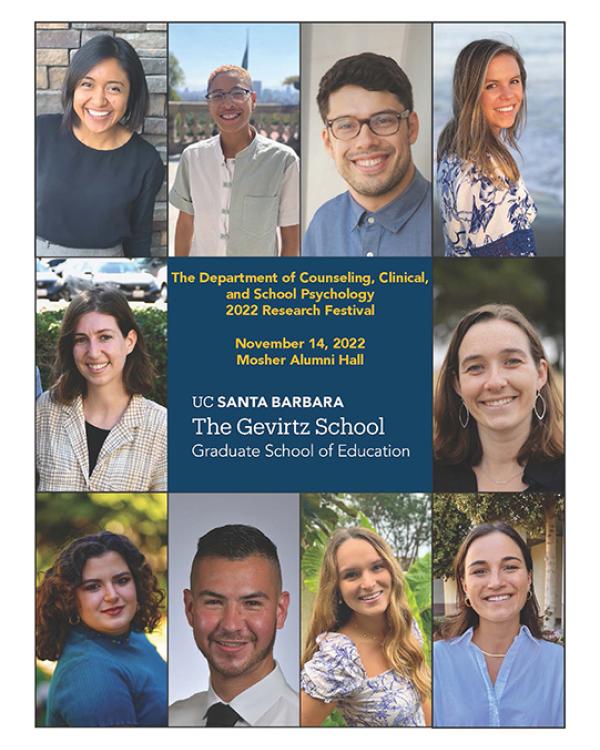
The Department of Counseling, Clinical, and School Psychology (CCSP) at the UC Santa Barbara Gevirtz School will be holding a Research Festival on Monday, November 14 from 8:40 am to 12:05 pm at Mosher Alumni House. The festival is free and open to the public. Ten students will be presenting their cutting-edge research during the symposium event. In order to receive their Master’s degree, all 2nd year CCSP students submit a research festival proposal in the spring. As 3rd year students, they present their findings to the department.
The presenters’ research spans relevant, intersectional topics such as the impacts of COVID-19, special education, relationships, and more.
Karina Aragón, M.Ed. • “Exploring the Role of Educator Beliefs in Special Education Disproportionality Among Emergent Bilinguals”
Jacquelyn (Jackie) Chin • “Acceptability and Feasibility of a Community-Based Mental Health Intervention for Black LGBTQIA+ (Queer) Young Adults”
Daniel Armando del Cid • “Impacts of COVID-19 on Mental Health Factors of Low-Income Workers and their Children”
Meghan C. Evans • “ACEs Screening and Strength-Based Prevention: Caregiver Perceptions”
Elana Hubert, MA • “Meaning Making in Service of Solidarity Work in the Jewish Community”
Alice Mullin • “‘It Just Felt Like Another Thing to Do’: Examining Teacher Barriers and Motivators to Utilizing Trauma-Informed Resources During COVID-19”
Yvette Ramirez, MA • “‘I Need to Be Suffering in Order to Be Okay:’ Latinx Daughters Raised in Violent Homes and Their Experiences in Intimate Relationships”
David B. Rivera • “An Exploration of Protective and Risk Factors Associated with Injectable Pre-exposure Prophylaxis (PrEP) Willingness among Men who Have Sex with Men”
Kaylin Russell • “START Connections: Outcomes of an Online Social Interaction Skill Group for Autistic Adolescents”
Madeline Spiess, M.Ed. • “Adolescent Mental Health within School and Home Contexts: Exploring the Moderating Role of Teacher-Student Relationships”
CCSP adheres to a scientist-practitioner training model; therefore, heavy emphasis is placed on developing academic, research, and practitioner knowledge and skills. The organizing themes that integrate the identity of the department are (a) the values of human diversity and individual differences (b) health and development across the lifespan, and (c) ecological (e.g., family, school, societal) influences on human behavior.
Degrees: Ph.D. in Counseling/Clinical or School Psychology; M.Ed. with Pupil Personnel Services Credential in School Psychology or M.A. in Counseling Psychology offered as an option en route to the Ph.D. once a student is admitted; terminal M.Ed. in School Psychology.